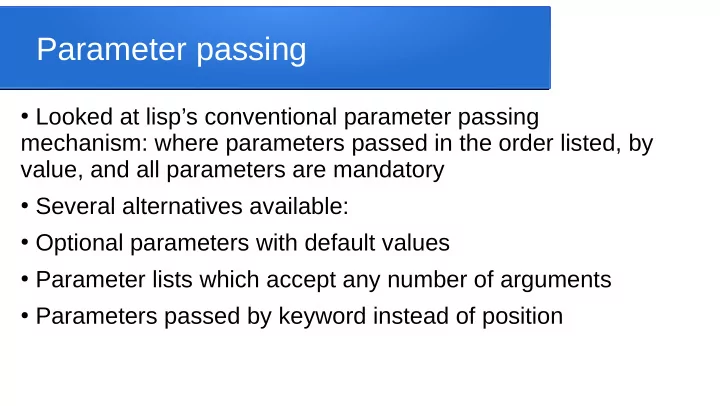

Parameter passing ● Looked at lisp’s conventional parameter passing mechanism: where parameters passed in the order listed, by value, and all parameters are mandatory ● Several alternatives available: ● Optional parameters with default values ● Parameter lists which accept any number of arguments ● Parameters passed by keyword instead of position
Optional parameters, &optional ● After the mandatory parameters (if any), we can include the keyword &optional followed by pairs of parameters/default values ● e.g. to make params w, x mandatory but y, z optional: (defun f (w x &optional (y 10) (z “foo”)) ● If 2 params passed, defaults are used (10 for y, “foo for z) ● If 3 params passed, third goes to y and default used for z ● If 4 params passed, third goes to y, the fourth to z
Example: read with optional prompt ● Recursive function to get/check an integer, with optional min/max for range (defun getint (&optional (min most-negative-fixnum) (max most-positive-fixnum)) .... use min/max normally within func .... ) ● (getint) ; get any int ● (getint 10) ; get int >= 10 ● (getint 5 100) ; get int in range 5..100
Error checking our parameters ● Of course, still need to error check passed values (defun getint (&optional (min most-negative-fixnum) (max most-positive-fixnum)) ; errcheck min/max, use most-neg, most-pos if bad (let* ; establish a valid min first, valid max second ((realmin (if (integerp min) min most-negative-fixnum)) (realmax (if (and (integerp max) (<= min max)) max most-negative-fixnum)) (userval nil))
Customize prompt based on range (cond ((and (= realmin most-negative-fixnum) (= realmax most-positive-fixnum)) (format t “Enter an integer: “)) ((= realmin most-negative-fixnum) (format t “Enter an integer less than ~A: “ realmax)) ((= realmax most-positive-fixnum) (format t “Enter an integer greater than ~A: “ realmin)) (t (format t “Enter an integer in the range ~A..~A: “ realmin realmax)))
Get/check value, recurse if needed (setf userval (read)) (cond ; if bad value then recurse, otherwise return it ((not (integerp userval)) (getint realmin realmax)) ((< userval realmin) (getint realmin realmax)) ((> userval realmax) (getint realmin realmax)) (t userval)))) ; note: should probably print error messages before recursing, e.g. (block TooBig (format t “~A too big, try again~%” userval) (getint realmin realmax))
&optional and accumulators ● For tail recursive functions, typically use optional params for the accumlators we added, e.g. rewrite of ‘smallest’: (defun smallest (L &optional (sofar most-postive-fixnum) (cond ((or (not (listp L)) (null L)) sofar) ((not (integerp (car L)) (smallest (cdr L) sofar)) ((< (car L) sofar) (smallest (cdr L) (car L))) (t (smallest (cdr L) sofar))))
Variable num of params, &rest ● We can list mandatory parameters (if any), then optional parameters (if any), then specify that any number (0+) of additional parameters may follow: &rest paramname ; mandatory x, optional y, all the rest go in L (defun f (x &optional (y 1.5) &rest L) ; L is actually a list of the “extras” ...) (f 1) ; y uses default, L is nil (f 1 2) ; x=1, y=2, L is nil (f 1 2 3) ; x=1, y=2, L is ( 3 )
Recursion and &rest ● Suppose we have (defun f (x &rest L) ...) ● Initial call might look like (f 1 2 3 4 5) so X=1, L=(2 3 4 5) ● Suppose inside function we want to chop off head of L, make recursive call with x and tail of L, desired effect is (f 1 3 4 5) ● Can’t just say (f x (cdr L)) , since that would really turn out like (f 1 (3 4 5)) ● Sneak peak at higher order functions, pass f as a parameter: (apply ‘f (cons x (cdr L)))
Apply and lists of parameters ● Higher order functions are just functions that accept other functions as parameters, we’ll revisit them lots later (apply ‘f L) runs function f with parameters from list L ● (apply ‘+ ‘(1 2 3)) acts like (f 1 2 3) ● So when L was (2 3 4 5) our call (apply ‘f (cons x (cdr L))) ● Acts just like (f x 3 4 5) , which is what we wanted
smallest using &rest ● smallest again, accept any num of params, returning most- positive-int by default (skip any elements that aren’t ints) (defun smallest (&rest L) (let ; locals for value of front element, and smallest of rest ; (both default to most-positive-fixnum) ((smInRest (if (> (length L) 1) (apply ‘smallest (cdr L)) most-positive-fixnum) (front (if (and (not (null L)) (integerp (car L))) (car L) most-positive-fixnum)))
Smallest using &rest ● Now simply compare the front to the rest, return smaller (if (< front smInRest) front smInrest))) ● Note that this time we did all the heavy lifting when computing the local vars ● Unfortunately, not a tail recursive solution
Keyword parameters, not positional ● So far, all our parameter passing has been positional: the first value passed goes to the first function parameter, the second value passed goes to the second, etc ● This is the way most languages handle parameter passing ● Lisp provides an alternative: keyword passing, using &key: in the function call we actually specify which value we want assigned to which parameter ● Means we need to know what the function parameter names are instead of which order they’re in
&key example ● Toy example function (defun display (&key e L) (format “~A, ~A~%” e L)) ● Call passing e first, L second (display e: 3 L: ‘(10 20 30)) ● Call passing L first, e second (display L: ‘(10 20 30) e: 3) ● We’ll see the : notation again with structures
Recommend
More recommend